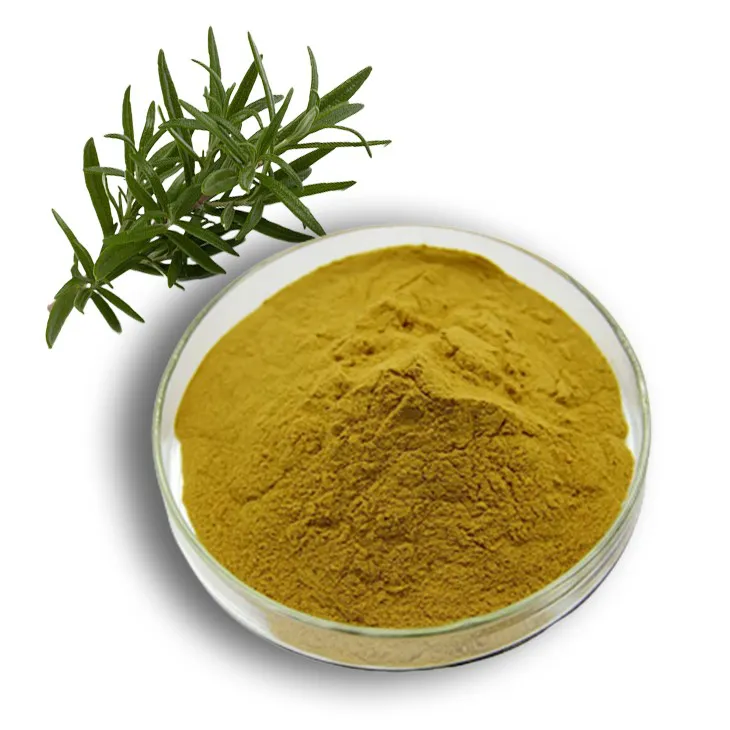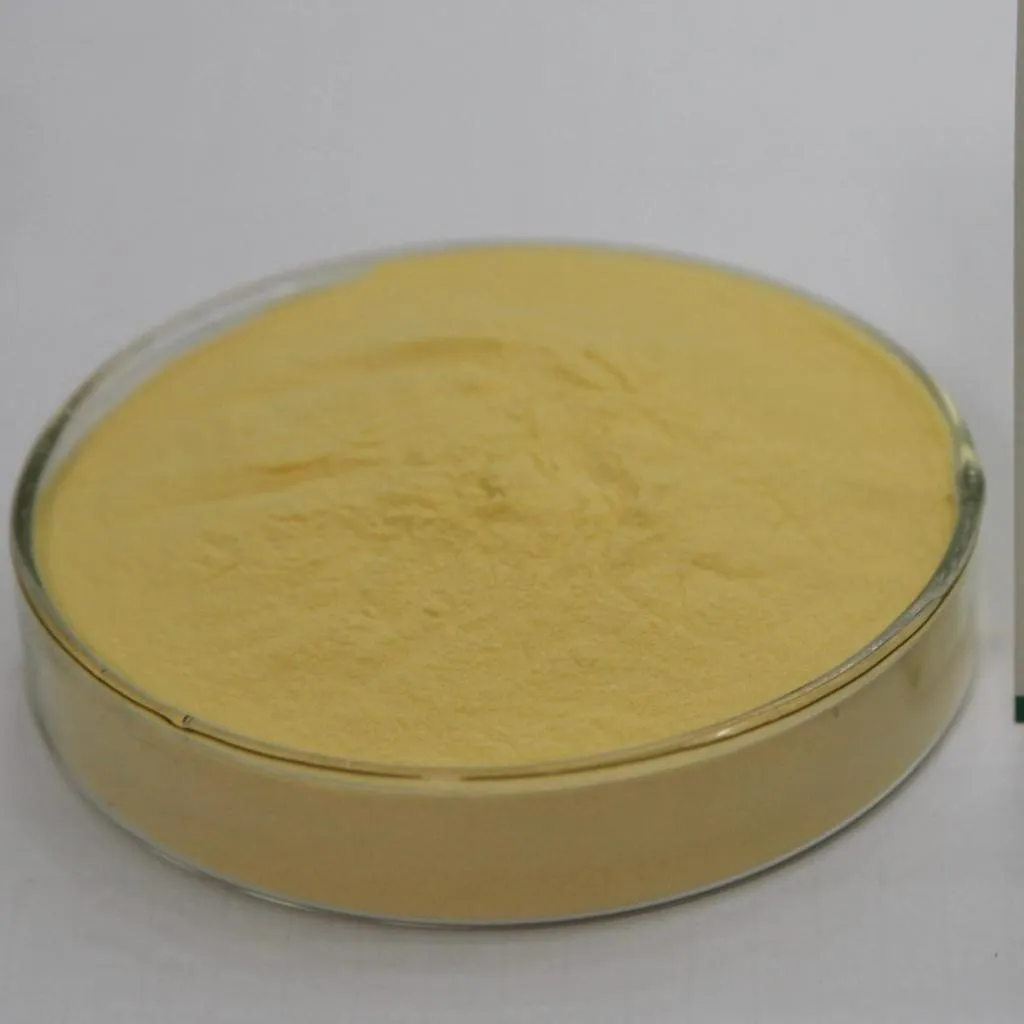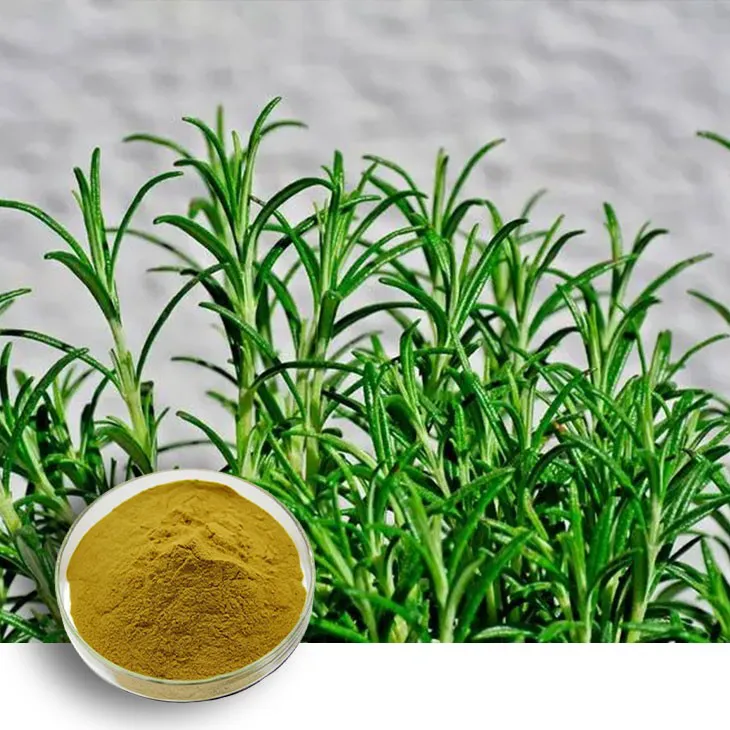- 0086-571-85302990
- sales@greenskybio.com
14 Major Health - care Effects of Rosemary Extract.
2024-11-12

1. Introduction to Rosemary extract
Rosemary extract is a natural product that has been used for centuries in traditional medicine. It is derived from the rosemary plant (Rosmarinus officinalis), which is native to the Mediterranean region. The extract contains a variety of bioactive compounds, such as phenolic diterpenes (e.g., carnosic acid and carnosol), flavonoids, and triterpenes. These compounds are responsible for the numerous health - care effects associated with Rosemary extract.

2. Antioxidant Properties
One of the most significant health - care effects of rosemary extract is its antioxidant activity. Antioxidants are substances that can neutralize free radicals in the body. Free radicals are unstable molecules that can cause damage to cells, proteins, and DNA through a process called oxidative stress. Oxidative stress has been linked to a wide range of diseases, including cancer, heart disease, and neurodegenerative disorders.
Rosemary extract contains powerful antioxidants, such as carnosic acid and carnosol. These compounds can scavenge free radicals and prevent oxidative damage. Studies have shown that rosemary extract can protect cells from oxidative stress - induced damage in vitro and in vivo. For example, in a study on rat liver cells, rosemary extract was found to reduce oxidative damage caused by a chemical toxin.

3. Anti - Inflammatory Effects
Inflammation is a natural immune response that helps the body to fight off infections and heal injuries. However, chronic inflammation can be harmful and has been associated with many diseases, such as arthritis, diabetes, and cardiovascular disease. Rosemary extract has been shown to have anti - inflammatory properties.
The anti - inflammatory effects of rosemary extract are thought to be due to its ability to inhibit the production of inflammatory mediators, such as cytokines and prostaglandins. In a study on human cells, rosemary extract was found to reduce the production of inflammatory cytokines. Another study in animals showed that rosemary extract could reduce inflammation in the joints of rats with arthritis.

4. Skin Health
Rosemary extract can also play an important role in promoting healthy skin. It has antioxidant and anti - inflammatory properties, which can protect the skin from damage caused by environmental factors, such as UV radiation and pollution.
Rosemary extract can also improve skin hydration and elasticity. A study on human skin cells showed that rosemary extract could increase the production of collagen, a protein that is important for skin structure and elasticity. In addition, rosemary extract has antimicrobial properties, which can help to prevent skin infections.

5. Liver Protection
The liver is an important organ that is involved in many metabolic processes, such as detoxification and protein synthesis. However, the liver can be damaged by various factors, such as alcohol, drugs, and toxins. Rosemary extract has been shown to have liver - protecting effects.
Studies have shown that rosemary extract can reduce liver damage caused by toxins, such as carbon tetrachloride. It can also improve liver function by increasing the activity of antioxidant enzymes in the liver. In addition, rosemary extract can prevent the development of liver fibrosis, a condition that can lead to liver cirrhosis.
6. Respiratory Health
Rosemary extract can also be beneficial for respiratory health. It has anti - inflammatory and antimicrobial properties, which can help to reduce inflammation in the airways and prevent respiratory infections.
In a study on patients with chronic obstructive pulmonary disease (COPD), rosemary extract was found to improve lung function and reduce symptoms. Another study in animals showed that rosemary extract could reduce inflammation in the lungs caused by a bacterial infection.
7. Cognitive Function
There is growing evidence that rosemary extract may have beneficial effects on cognitive function. It has antioxidant and anti - inflammatory properties, which can protect the brain from damage caused by oxidative stress and inflammation.
Studies have shown that rosemary extract can improve memory and learning in animals. In addition, some human studies have suggested that rosemary extract may be beneficial for patients with mild cognitive impairment or Alzheimer's disease. However, more research is needed to confirm these findings.
8. Cardiovascular Health
Rosemary extract may also have positive effects on cardiovascular health. It has antioxidant and anti - inflammatory properties, which can reduce the risk of heart disease.
Studies have shown that rosemary extract can reduce blood pressure, cholesterol levels, and platelet aggregation. These effects can help to prevent the development of atherosclerosis, a condition in which the arteries become narrowed and hardened due to the buildup of plaque.
9. Anti - Cancer Properties
There is some evidence that rosemary extract may have anti - cancer properties. It has antioxidant and anti - inflammatory properties, which can prevent the initiation and progression of cancer.
Studies have shown that rosemary extract can inhibit the growth of cancer cells in vitro and in vivo. It can also induce apoptosis (programmed cell death) in cancer cells. However, more research is needed to fully understand the anti - cancer mechanisms of rosemary extract and to determine its potential as a cancer treatment.
10. Digestive Health
Rosemary extract can also be beneficial for digestive health. It has antimicrobial properties, which can help to prevent the growth of harmful bacteria in the gut.
In addition, rosemary extract can improve digestion by increasing the production of digestive enzymes. It can also reduce inflammation in the gut, which is beneficial for patients with inflammatory bowel diseases, such as Crohn's disease and ulcerative colitis.
11. Anti - Diabetic Effects
There is some evidence that rosemary extract may have anti - diabetic effects. It has antioxidant and anti - inflammatory properties, which can help to prevent the development of diabetes and its complications.
Studies have shown that rosemary extract can improve insulin sensitivity and reduce blood sugar levels in animals. However, more research is needed to confirm these findings in humans.
12. Anti - Aging Effects
Rosemary extract may also have anti - aging effects. It has antioxidant and anti - inflammatory properties, which can protect cells from damage caused by oxidative stress and inflammation, two processes that are associated with aging.
In addition, rosemary extract can stimulate the production of collagen and elastin, two proteins that are important for maintaining skin elasticity and reducing the appearance of wrinkles. However, more research is needed to fully understand the anti - aging mechanisms of rosemary extract.
13. Immune System Support
Rosemary extract can also support the immune system. It has antimicrobial and anti - inflammatory properties, which can help the body to fight off infections and reduce inflammation.
Studies have shown that rosemary extract can enhance the activity of immune cells, such as macrophages and lymphocytes. It can also increase the production of antibodies, which are important for immune defense.
14. Conclusion
In conclusion, rosemary extract is a natural wonder with a wide range of health - care effects. It has antioxidant, anti - inflammatory, antimicrobial, and other properties that can be beneficial for various aspects of health, including skin health, liver protection, respiratory health, cognitive function, cardiovascular health, and more. However, more research is needed to fully understand the mechanisms of action of rosemary extract and to determine its optimal dosage and application in different health conditions.
FAQ:
What are the main antioxidants in rosemary extract?
Rosemary extract contains antioxidants such as carnosic acid and rosmarinic acid. These antioxidants are effective in combating free radicals in the body.
How does rosemary extract reduce inflammation?
It may work by modulating certain signaling pathways in the body related to the inflammatory response. The antioxidants in rosemary extract can also prevent oxidative stress, which is often associated with inflammation.
Can rosemary extract really improve skin health?
Yes, it can. The antioxidants in rosemary extract can protect the skin from damage caused by free radicals, such as premature aging. It may also have anti - microbial properties that can help keep the skin clean and healthy.
What is the mechanism of rosemary extract in protecting the liver?
It may help by reducing oxidative stress in the liver cells. Rosemary extract can also enhance the liver's detoxification processes and protect liver cells from damage caused by toxins.
How does rosemary extract contribute to respiratory health?
It may have anti - inflammatory and antioxidant effects in the respiratory system. This can help reduce inflammation in the airways and protect the respiratory tissues from oxidative damage.
Related literature
- The Antioxidant and Anti - Inflammatory Properties of Rosemary Extract"
- "Rosemary Extract: A Promising Natural Agent for Skin Health"
- "The Role of Rosemary Extract in Liver Protection"
- "Rosemary Extract and Respiratory Health: Current Research"
- ▶ Hesperidin
- ▶ Citrus Bioflavonoids
- ▶ Plant Extract
- ▶ lycopene
- ▶ Diosmin
- ▶ Grape seed extract
- ▶ Sea buckthorn Juice Powder
- ▶ Fruit Juice Powder
- ▶ Hops Extract
- ▶ Artichoke Extract
- ▶ Mushroom extract
- ▶ Astaxanthin
- ▶ Green Tea Extract
- ▶ Curcumin
- ▶ Horse Chestnut Extract
- ▶ Other Product
- ▶ Boswellia Serrata Extract
- ▶ Resveratrol
- ▶ Marigold Extract
- ▶ Grape Leaf Extract
- ▶ New Product
- ▶ Aminolevulinic acid
- ▶ Cranberry Extract
- ▶ Red Yeast Rice
- ▶ Red Wine Extract
-
Bitter Melon Extract
2024-11-12
-
Senna Leaf Extract
2024-11-12
-
Shikonin
2024-11-12
-
Marigold Extract
2024-11-12
-
Green coffee bean Extract
2024-11-12
-
Soy Extract
2024-11-12
-
Purple Sweet Potato Extract
2024-11-12
-
Berberis aristata Extract
2024-11-12
-
Fig Extract
2024-11-12
-
Black Pepper Extract
2024-11-12





















